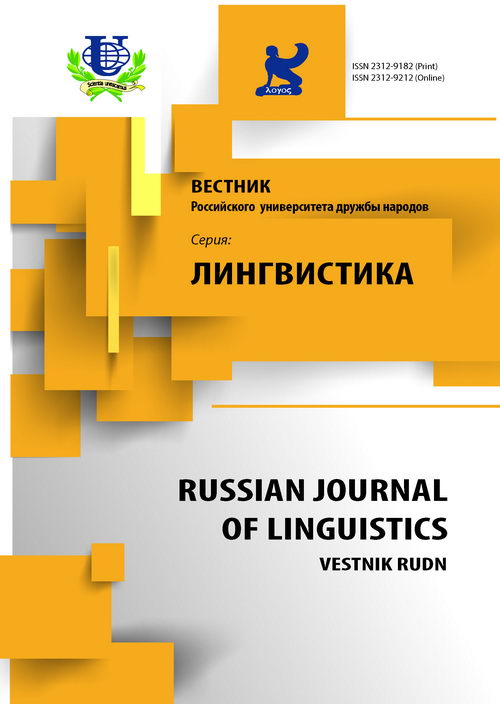Прагматика эмоций в современном рекламном дискурсе (на материале французского языка)
- Авторы: Борисова А.С.1, Рубинштейн К.Э.1
-
Учреждения:
- Российский университет дружбы народов
- Выпуск: № 2 (2015)
- Страницы: 133-147
- Раздел: Статьи
- URL: https://journals.rudn.ru/linguistics/article/view/9355
- ID: 9355
Цитировать
Полный текст
Аннотация
В силу своей коммуникативной специфики современный печатный рекламный дискурс вызывает особый интерес для изучения с позиций теории эмотивности. Проявление и выражение эмоций в контексте рекламной коммуникации представляет собой намерение создателя рекламного сообщения вызывать определенную эмоциональную реакцию со стороны реципиента (целевой аудитории), воздействовать на него в нужном рекламодателю/производителю ракурсе. В статье предпринята попытка анализа идейно-образного содержания современных печатных рекламных сообщений (на материале французского языка), целью которого стало выявление реализующихся в них форм вербальной экспликации эмоциональных констант и определение их роли в реализации прагматических установок, релевантных для данного вида дискурса. Базируясь на методологии лингвистики эмоций, лингвоэкологии, коммуникативной лингвистики, методах прагматического, стилистического, дискурсивного, сопоставительного и лингвокультурологического анализа, мы выделяем такие эмоциональные/эмотивные репрезентации, в которых прагматическая направленность коррелируется со степенью эмоциональной открытости или сдержанности участников рекламного дискурса. Особое внимание уделяется апеллятивным моделям/стратегиям, как наиболее ярким проявлениям языковой эмотивности, анализируются особенности эмоциональной аргументации в сравнении с рациональной, затрагивается сфера социальных норм эмоционального поведения, обусловленных особенностями культуры.
Об авторах
Анна Степановна Борисова
Российский университет дружбы народов
Email: borissovaa_anna@mail.ru
Кафедра иностранных языков филологического факультета
Ксения Эдуардовна Рубинштейн
Российский университет дружбы народов
Email: shusha@inbox.ru
Кафедра иностранных языков филологического факультета
Список литературы
- Кубрякова Е.С. Язык и знание: На пути получения знаний о языке: Части речи с когнитивной точки зрения. Роль языка в познании мира / РАН ИЯ. М.: Языки славянской культуры, 2004.
- Шаховский В.И. Категоризация эмоций в лексико-семантической системе языка. Воронеж, 1987.
- Шаховский В.И. Эмоции - мотивационная основа человеческого сознания // Статьи электронной библиотеки ВГПУ. 2003. URL: http://www.vspu.ru.
- Густав Ле Бон Психология народов и масс. СПБ.: Изд. «Макет», 1995.
- Нордстрем К., Риддерстрале Й. «Бизнес в стиле Фанк» Translation Copyright© Стокгольмская школа экономики в Санкт-Петербурге, 2002. Издание третье.
- Sampson H. Аdvertising from the earliest times. N.Y., 1961.
- Головлёва Е.В. Основы рекламы. М.: Эксмо, 2003.
- Васильева М.А. Несколько слов о французской рекламе // Искусство рекламы. 2009. № 2. С. 34-38.
- Васильев А. История французской моды. М.: Захаров, 2004.
- Гадамер Х-Г. Истина и метод. Основы философской герменевтики. М.: Прогресс, 1998.
- Мадариага С. Англичане, испанцы, французы. СПб.: Наука, 2003.
- Япп Н., Сиретт М. Эти странные французы. М.: Эгмонт, 2008.
- Фулье А. Психология французского народа. СПб., 1994.
- Кургузенкова Ж.В. Фразеологические единицы, номинирующие мужчину-ловеласа во французском и русском языках // Вестник РУДН. Серия «Лингвистика». 2015. № 1. C. 132-140.
Дополнительные файлы















